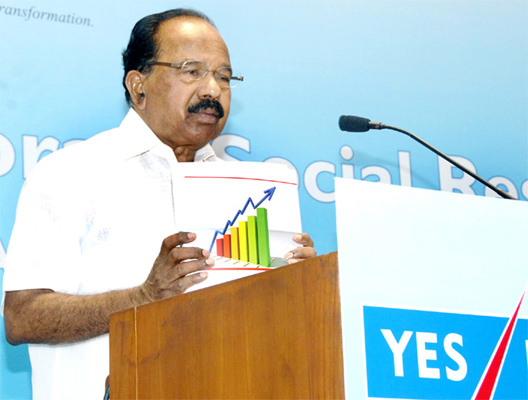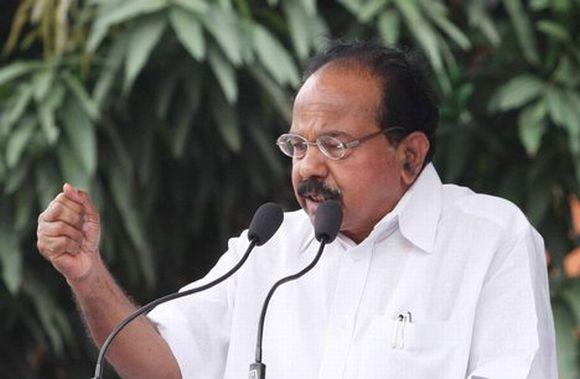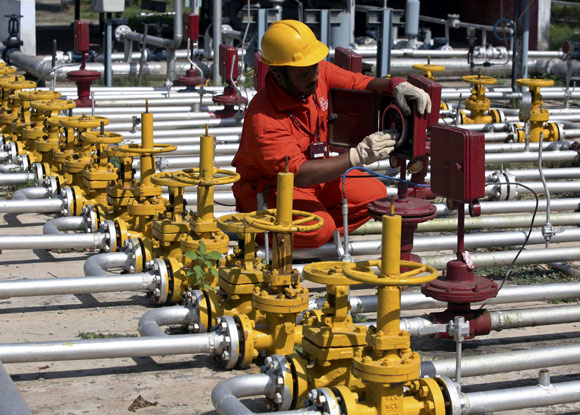 | « Back to article | Print this article |
Is Moily's 'import lobby' only gas?
Despite the oil import bill running into $160 billion (about Rs 9.4 lakh crore at the current exchange rate) and the rupee depreciating to its current low, Petroleum Minister Veerappa Moily's allegation that an import lobby was against an increase in gas prices has found no takers among sectoral experts.
An increase in the domestic natural gas price is seen as beneficial for not only all gas producers in the country but also for imported gas.
Currently, imported gas at over $10 a million British thermal unit (mBtu) is sold at more than double the rate of domestic gas.
The minister might be right in saying a price rise for domestic gas should incentivise producers and reduce dependence on imports. But gas market insiders say with domestic gas available at cheap rates, imported gas brought into the country as liquefied natural gas (LNG) and sold after regasification finds the market tough.
Click NEXT to read more...
Is Moily's 'import lobby' only gas?
Predictably, no gas import lobby would want a freeze on the domestic price.
Gas is currently imported at the Gujarat-based regasification terminals of Petronet LNG Ltd (PLL) and Shell.
PLL is a private company but has the Union petroleum secretary as its ex-officio chairman and government-owned GAIL India and oil marketing companies as its promoters.
Shell is an insignificant player in the market, with PLL dominating the LNG market. But despite all the marketing muscle of its promoters, PLL is finding it hard to sign a gas sales and purchase agreement (GSPA) for base load capacity of its upcoming Kochi terminal.
“Initially, we signed a GSPA with NTPC but later on it backed out. Today, there is no such GSPA signed. The first base will be running on spot or mid-term gas when it starts supply by November,” B C Tripathi, GAIL India chairman, told Business Standard in a recent interview.
Click NEXT to read more…
Is Moily's 'import lobby' only gas?
Moily raised the issue of an import lobby and alleged threat to petroleum ministers in response to allegations made by Gurudas Dasgupta, a Communist Party of India (CPI) member of Parliament.
The veteran CPI leader has turned Moily’s bete noire ever since. “I am not part of any lobby.
By the way, the only two companies importing gas in India are two public sector undertakings, GAIL and Petronet LNG. Are they part of the import lobby?” said a furious Dasgupta when he addressed the media yesterday on the issue of a penalty on Reliance Industries.
Dasgupta has written letters to the prime minister and held two media briefings alleging connivance between the minister and RIL but has refused the minister’s invitation for a discussion.
If the minister’s allegation hinted at the crude oil import lobby, even then the argument does not hold true. Government-controlled oil marketing companies are the biggest players in the domestic market.
Click NEXT to read more...
Is Moily's 'import lobby' only gas?
They collectively control around 48 per cent market share in naphtha and 90 per cent in furnace oil, fuels that compete with natural gas, said a senior executive who did not want to be named.
The fertiliser and power sectors are the major users of these fuels, though currently no supply from RIL’s KG-D6 field is going to the power sector.
The minister’s off-the-cuff remark has found no takers even in the political circles. “The situation demands that Moily names the import lobby. He should be bold enough to identify,” said Ram Naik, former petroleum minister. Naik alleged the minister was trying to hide his “failure in controlling petroleum prices” in general by “passing the buck”. Naik said he did not come across any import lobby during his tenure.
“The only lobby I came across during my five years was the liquor lobby that went to Atal Bihari Vajpayee, then Prime Minister, against my decision to introduce ethanol blending,” the BJP leader said.
Click NEXT to read more...
Is Moily's 'import lobby' only gas?
Vajpayee then decided not to change the policy which benefited the farmers and put a price on molasses that were being sold to liquor industry at throwaway rates. “The moment Ram Naik left and Manmohan Singh’s ministers came in, ethanol blending was stopped,” he alleged.
Naik, unlike Dasgupta, did not oppose a price rise for natural gas but said the policy of boosting exploration and production was not being followed by the UPA government.
Interestingly, the same argument is being given by both Moily and finance minister P Chidambaram, who are currently creating ground for a meeting of the Cabinet Committee on Economic Affairs which is to decide on the ticklish issue of a gas price rise.





